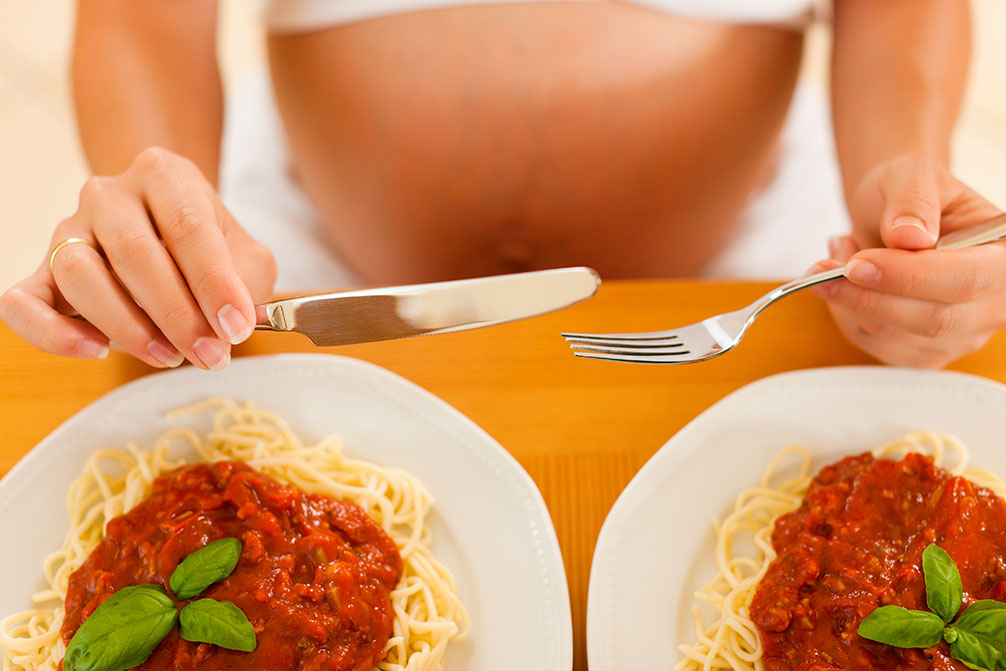By: Julie Cox
Is eating for two really the right thing to do when pregnant? No. It most definitely shouldn’t be the case or an excuse to overindulge.
Many women who do ‘eat for two’ end up gaining an excessive amount of weight. While you certainly should be increasing the amount of certain nutrients in foods you consume, being smart with your food choices should be the key. When you want to eat, ask yourself if it’s a healthy food or not. Some people often binge on foods thinking they need to as they are tired and need more energy, but unhealthy foods have the opposite effect on us and in fact take energy away from us.
Remember that you aren’t eating for two adults, but rather for yourself and a growing foetus. You should only be eating a little more to help the baby grow and develop inside you, and that little more should only be around 300 additional healthy calories per day which is equivalent to a slice of wholegrain toast with a tablespoon of peanut butter.
The ideal amount of weight gain during pregnancy depends on your starting point. During the forty weeks you should gain approximately 10-15 kilos if you begin at a normal weight. If you’re overweight at the start of your pregnancy, you should only gain 6-10 kilos.
The pattern of weight gain varies among women. Commonly, a woman will gain 1-3 kilos in the first trimester, and then up to half a kilo per week in the second and third trimesters. If you don’t follow this pattern, though, that’s okay, too. There are women who gain nothing or even lose weight in the beginning, and others who will put on 5 kilos in one month and gain nothing for the next few weeks.
The overall total weight gain and the growth of baby are far more important than the week-to-week numbers. Your metabolism will adjust to allow weight gains and plateaus as your baby needs. Your doctor should monitor this, and let you know if you should increase your calorie intake or lower it. It’s important to remember that weight gain can fluctuate from woman to woman, and you don’t want to under or over eat. Your doctor can suggest what kinds of foods you should add to or cut from your diet as you progress throughout your pregnancy.
Keep in mind that your foetus is absorbing everything it needs, and will be efficient in doing so, even if you aren’t gaining weight. Ultimately, if you eat well and keep up a healthy diet, your body will gain exactly what it needs. Also know that the growing foetus receives nutrition from the mother’s blood in the basic forms of protein, carbohydrate, and fat, so the baby isn’t eating exactly what you eat. The baby’s nutrition comes from fully digested food from the mother, meaning it only takes in the necessary nutrients from the food that’s already gone through your digestive system. This means if you eat an ice cream cone, the baby doesn’t eat ice cream, but rather takes the protein, fat, and sugar after you’ve digested your ice cream cone.
This doesn’t mean you can eat anything you want, though. As the baby is still taking the nutrients it needs, you’ll still need nutrients to keep yourself healthy. We recommend making as many good, healthy food choices as possible. Listen to your body’s cravings, and don’t use pregnancy as an excuse to eat a lot of unhealthy processed foods and a lot of sugar.
If you keep your diet healthy and balanced, remember not to overeat, and continue monitoring your weight gain with your doctor, you and baby are one step closer to a happy, healthy little one joining you at the end of the road!
A dangerous side effect of over eating and not being careful about your craving choices is the increased risk of gestational diabetes, backaches, high blood pressure and needing a cesarean birth because your baby is very large. Its best to fuel your system with healthy foods so you are feeling as energetic as you can. Foods that also will keep you fuller for longer too can help subside cravings and snacking. But when in doubt, always check in with your doctor.
FOODS TO AVOID: sugars, white bread, white rice, white pastas, soda drinks, fast foods, deep fried food, potatoes, fatty meats.
FOODS TO EAT MORE OF: brown rice, wholemeal pasta, brown/multi-grain bread, fruits, vegetables, wraps, salads, water, lean meats.
Julie is mum to a sassy 2 and a half-year-old girl who keeps her moving. Her passion for mums/women’s fitness has catapulted a career in a range of fields from exercise to eating healthy, supplements, and serving up great lunchbox treats. You can find more about Julie at www.facebook.com/MumsInMotion


